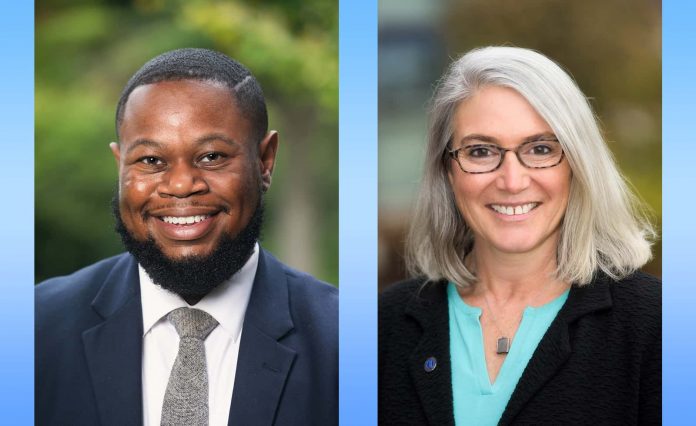Under the mantle of social justice, Southern Connecticut State University has long been committed to addressing systemic barriers to equity. A new campus initiative has been established to further implement strategic and sustainable partnerships between Southern and the wider community.
The Integrated Justice and Social Change Collaborative (IJSC), launching Friday, Nov. 5, will be co-directed by Sousan Arafeh, professor in educational leadership and policy studies and special assistant to the dean of the College of Education, and Kelvin Rutledge, director of the Office of Career and Professional Development.
“The IJSC Collaborative will serve as an interdisciplinary hub and umbrella for coalition-building and engaged action directed at addressing and dismantling systemic and structural barriers to equity,” said President Joe Bertolino.
As part of the Division of Diversity, Equity, and Inclusion, the Collaborative advances SCSU’s commitment to social justice, anti-oppression, and anti-racism through the areas of education, research, and partnerships with community and institutional stakeholders in the Greater New Haven community, Connecticut, nationally, and internationally, Bertolino said.
The president said that Arafeh and Rutledge’s combined expertise in community and external relations, and research and partnerships “will help us centralize and amplify our efforts towards equity and justice across multiple areas of the university.”
“Moreover, they will aim to help Southern build stronger connections across a variety of stakeholders and organizations so that – together – our collective capacity can be greater for the future,” Bertolino said.
The IJSC Collaborative will begin planning and implementing events, services, and engagement opportunities in spring 2022.
“Southern has a unique, historic relationship to social justice. It also has students, alumni, and community and institutional partners throughout the state and beyond. We would like to identify people and organizations interested in creating innovative partnerships toward equitable change. We want to create a robust network, make connections, and engage in co-created action,” Arafeh said.
To that end, “In the first few months, the IJSC Collaborative will be reaching out to potential collaborators interested sharing ways they would like to engage in social justice, anti-racism, and anti-oppression work. The Collaborative will focus on communities and organizations outside of Southern,” Rutledge said.
Going forward, it will serve as an interdisciplinary hub “to seek out ways for change institutionally, in New Haven, and also in the state, and beyond, said Diane Ariza, appointed in summer 2020 as Southern’s first Vice President for Diversity, Equity and Inclusion.
“Not everyone knows how to actively engage in making change,” she said. “How do we create, as a society, a social justice/equity lens? The IJSC Collaborative will be working on how individuals and groups work and learn from each other to create collective, lasting change.”
The Collaborative will focus on three overlapping areas: education, research, and partnerships. Its work will include conferences, workshops, and performances to research studies, outreach, policy and legislative advocacy, and more.
While Southern and its individual departments are working consistently to make strides in addressing inequities, the IJSC Collaborative will also focus on ways to interconnect and affiliate.
“We want to connect, develop, and amplify the capacity that results from partnership among community organizations and institutions, including Southern,” Rutledge said. “We want to be mindful that there are partnerships that could have enormous equity impacts, but have not yet been formed.
“As we lay the groundwork, we want to connect with local groups and individuals like the Citywide Youth Coalition, the New Haven Pride Center, New Haven Youth Services, and Black Lives Matter,” he said. “We need to learn what is possible when these voices connect.”
There’s limitless work to be done, but change is possible when people and groups collaborate, Arafeh said. Through the work of the Collaborative, she and Rutledge are eager to explore what partnership possibilities exist when new and perhaps unlikely connections are made. Those interested in learning more or connecting should contact: IJSCCollaborative@southernct.edu. The new organization’s website is: https://www.southernct.edu/ijscc.


